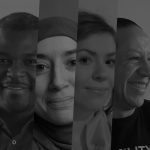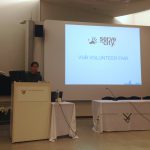 On the outside, the baroque-style Béguinage Church in the heart of Saint Catherine looks like any other. Imposing and intricate, the stone building summons us closer. It’s Saturday, February 22nd: Focus Day. Together with seven other volunteers from Serve the City, two of them group leaders, I will spend the next few hours finding out what makes this church so different from any other. At the entrance, two men greet us in hesitant English. They smile warmly as they shake hands with each of us. Still not knowing what to expect, yet feeling encouraged, I step inside. My attention is immediately driven to the left of the church, where a few tents have been set up. Made of what appears to be white cloth, they stand in odd contrast to the gloomy grandeur of the space. Out of the tents, emerge another three men, and there are handshakes all around. Bonjours, hellos and names are exchanged, the snack bags placed on the ground. Before arriving, we know only this about the community we are visiting: That they are around fifty Afghan asylum-seekers, all men; that they are waiting to hear back from authorities on their applications for asylum; that the Béguinage Church has given them this space, right here, to live in the meantime; that some of them have been waiting for over two years. We know, too, that while many of these men are single, many might be married and have children, yet have been separated from their families in the process of asylum-seeking. I’m a little confused on this point –where are their families? –but don’t want to ask. It’s probably a painful door to open.
On the outside, the baroque-style Béguinage Church in the heart of Saint Catherine looks like any other. Imposing and intricate, the stone building summons us closer. It’s Saturday, February 22nd: Focus Day. Together with seven other volunteers from Serve the City, two of them group leaders, I will spend the next few hours finding out what makes this church so different from any other. At the entrance, two men greet us in hesitant English. They smile warmly as they shake hands with each of us. Still not knowing what to expect, yet feeling encouraged, I step inside. My attention is immediately driven to the left of the church, where a few tents have been set up. Made of what appears to be white cloth, they stand in odd contrast to the gloomy grandeur of the space. Out of the tents, emerge another three men, and there are handshakes all around. Bonjours, hellos and names are exchanged, the snack bags placed on the ground. Before arriving, we know only this about the community we are visiting: That they are around fifty Afghan asylum-seekers, all men; that they are waiting to hear back from authorities on their applications for asylum; that the Béguinage Church has given them this space, right here, to live in the meantime; that some of them have been waiting for over two years. We know, too, that while many of these men are single, many might be married and have children, yet have been separated from their families in the process of asylum-seeking. I’m a little confused on this point –where are their families? –but don’t want to ask. It’s probably a painful door to open.  Some volunteers begin to offer hot drinks as the rest of us stand around and make some small talk with the men. I must confess, it’s a little awkward at first. There is so much I want to know, but I have no idea where to begin. I’m afraid of saying the wrong thing, afraid of invading their space, their privacy. Still, we quickly find common ground and before I know it, I’m immersed in a conversation about the language landscape in Afghanistan. Soon, someone suggests a game of cards, and five of us –three volunteers from Chile, Egypt and Spain, plus three Afghans- settle around a large table and being playing. We laugh and joke around as Ahmed –not his real name—explains the game in a mixture of English, French, Pashtu and hand gesturing. Everybody seems to be having a good time, and I almost forget where we are. “Guys” –says one of the leaders, approaching our group – “I’m sorry to ruin the party, but I think you better move inside the tents… Some of the visitors are complaining that you’re using the altar to play cards,” she explains, apologetically. That brings me back to reality: These men live in this church, with visitors strolling in and out, and mass still celebrated on Sundays. They spend their days here, unable to work, separated from their families and estranged from their war-torn country, waiting, sometimes for months on end. “It’s a catastrophe,” one of them tells me, later. It’s only his second day here. He’s already squatted in Switzerland, Germany and Italy. “There’s no heating, no toilets, no showers. Nothing. A catastrophe”. Of course, living in a church is better, much better, than being completely homeless. Here, the men have a roof over their heads; they have meals, and they have each other. But it’s not a sustainable situation. They are estranged from Belgian society, quite literally hidden away in the shadows. Some of them have already had their asylum applications refused; they can only keep trying, no matter how slight their hope. There is no going back to Afghanistan, at least not anytime soon. Once inside the tent, the card game resumes. At one point, though, one of the men stops and asks another to translate. He speaks in Pashto. “He says we’re happy you’re here,” the friend translates. “This food you bring, this coffee, this tea—none of that really matters. What matters is your company, your support. We’re very glad you’re here”. I’m still not quite sure of my place here, not sure what our presence really means to these men—but it’s appreciated, and for now, at least, that’s all I need to know. I smile as I say a quiet thank you.
Some volunteers begin to offer hot drinks as the rest of us stand around and make some small talk with the men. I must confess, it’s a little awkward at first. There is so much I want to know, but I have no idea where to begin. I’m afraid of saying the wrong thing, afraid of invading their space, their privacy. Still, we quickly find common ground and before I know it, I’m immersed in a conversation about the language landscape in Afghanistan. Soon, someone suggests a game of cards, and five of us –three volunteers from Chile, Egypt and Spain, plus three Afghans- settle around a large table and being playing. We laugh and joke around as Ahmed –not his real name—explains the game in a mixture of English, French, Pashtu and hand gesturing. Everybody seems to be having a good time, and I almost forget where we are. “Guys” –says one of the leaders, approaching our group – “I’m sorry to ruin the party, but I think you better move inside the tents… Some of the visitors are complaining that you’re using the altar to play cards,” she explains, apologetically. That brings me back to reality: These men live in this church, with visitors strolling in and out, and mass still celebrated on Sundays. They spend their days here, unable to work, separated from their families and estranged from their war-torn country, waiting, sometimes for months on end. “It’s a catastrophe,” one of them tells me, later. It’s only his second day here. He’s already squatted in Switzerland, Germany and Italy. “There’s no heating, no toilets, no showers. Nothing. A catastrophe”. Of course, living in a church is better, much better, than being completely homeless. Here, the men have a roof over their heads; they have meals, and they have each other. But it’s not a sustainable situation. They are estranged from Belgian society, quite literally hidden away in the shadows. Some of them have already had their asylum applications refused; they can only keep trying, no matter how slight their hope. There is no going back to Afghanistan, at least not anytime soon. Once inside the tent, the card game resumes. At one point, though, one of the men stops and asks another to translate. He speaks in Pashto. “He says we’re happy you’re here,” the friend translates. “This food you bring, this coffee, this tea—none of that really matters. What matters is your company, your support. We’re very glad you’re here”. I’m still not quite sure of my place here, not sure what our presence really means to these men—but it’s appreciated, and for now, at least, that’s all I need to know. I smile as I say a quiet thank you.







